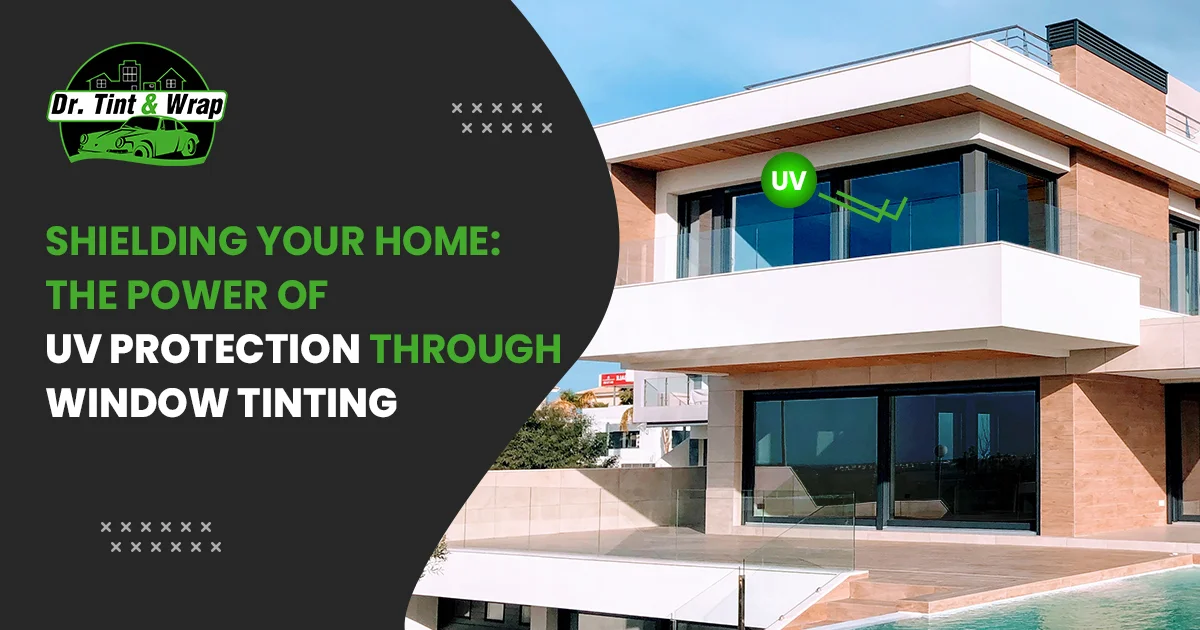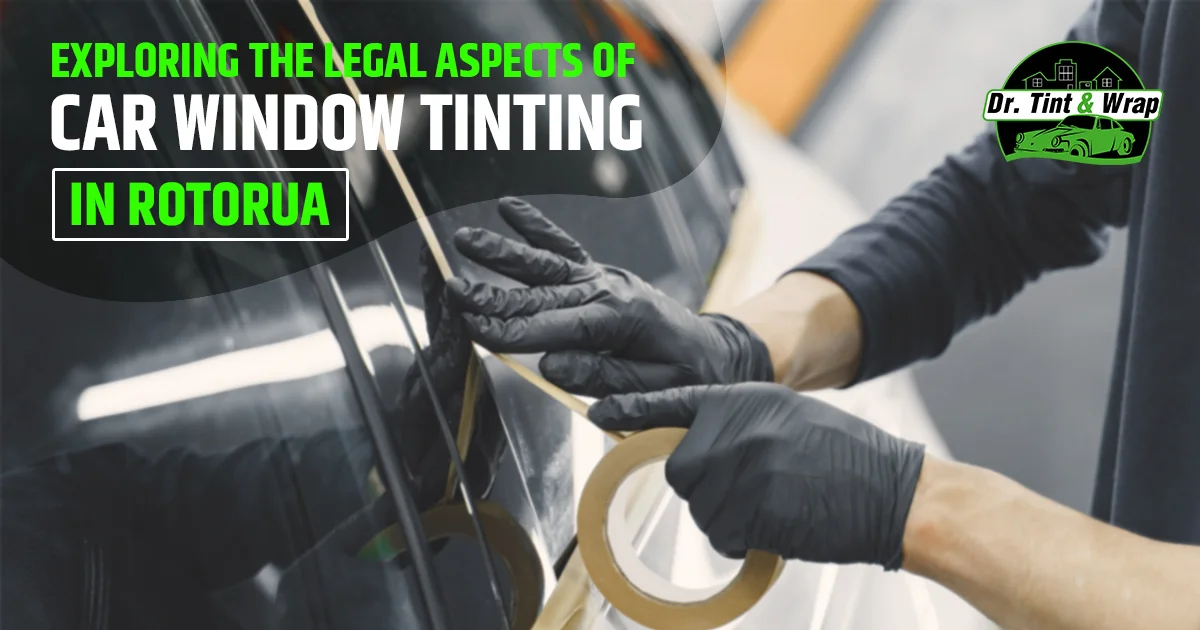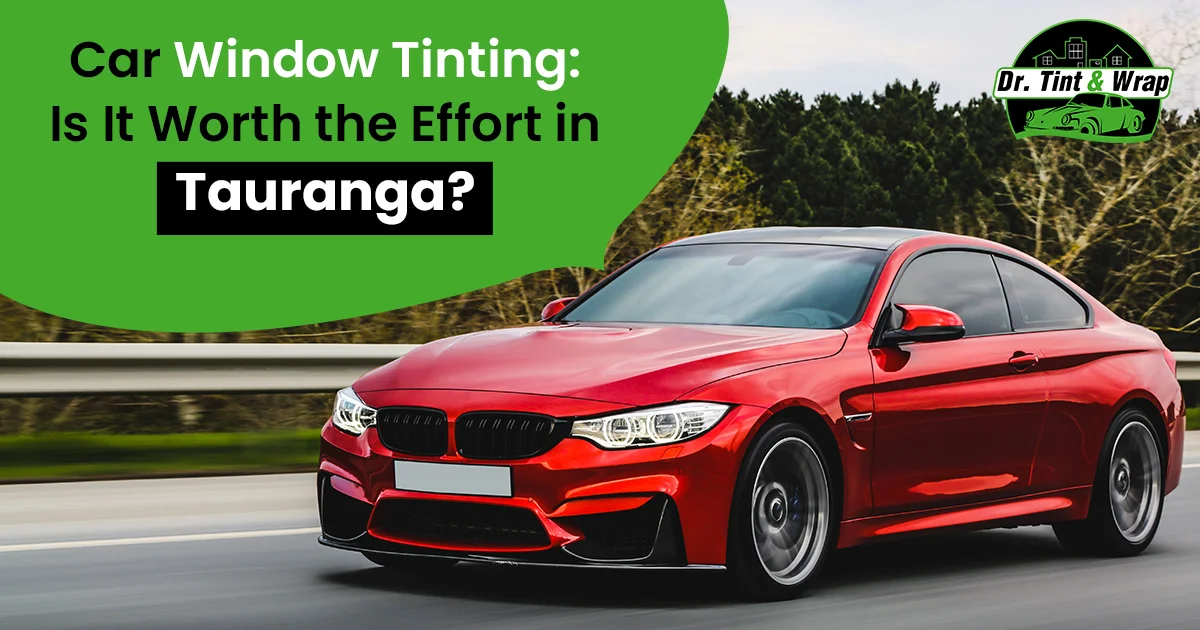.webp)
Top 5 Benefits of Having Your Car Windows Tinted
12 Jan 2024, By AdminIntroduction
Car window tinting has become a popular trend among car enthusiasts, and for good reason. Beyond the stylish appearance it lends to your vehicle, car window tinting offers a plethora of benefits that go beyond aesthetics. In this blog, we will delve into the top 5 advantages of having your car windows tinted, shedding light on the many reasons why this automotive enhancement has gained widespread popularity.
UV Ray Protection
One of the primary advantages of car window tinting is its ability to block harmful ultraviolet (UV) rays from the sun. Prolonged exposure to UV rays can lead to various health issues, including skin cancer. Tinted windows act as a barrier, reducing UV radiation and protecting both the driver and passengers from potential sun damage.
Heat Reduction
On a scorching hot day, the temperature inside your car can skyrocket. Window tinting acts as a barrier against the sun's heat, reducing the interior temperature and making your driving experience more pleasant. By minimizing heat buildup, you can rely less on your air conditioning, leading to improved fuel efficiency and reduced strain on your vehicle's cooling system.
Enhanced Privacy and Security
Privacy is a key concern for many car owners, and window tinting provides an effective solution. Darkened windows make it harder for prying eyes to see into your vehicle, protecting your belongings and ensuring a greater sense of security. This added privacy can be particularly beneficial when parked in public places, reducing the risk of theft and break-ins.
- Glare Reduction:
Driving in bright sunlight can be challenging, with glare from the sun often causing discomfort and safety hazards. Car window tinting significantly reduces glare, providing a clearer and safer view of the road ahead. This is especially valuable during sunrise and sunset, as well as in adverse weather conditions. By minimizing glare, window tinting contributes to improved visibility and overall driving safety.
- Aesthetic Appeal:
While the functional benefits of car window tinting are numerous, there's no denying the aesthetic appeal it brings to a vehicle. Tinted windows give your car a sleek, sophisticated look that sets it apart from others on the road. The variety of tint shades available allows you to customize the appearance of your car, adding a touch of personal style.
What is car window tinting, and how does it work?
Car window tinting involves applying a thin film to the windows of a vehicle to reduce the amount of visible light, infrared radiation, and ultraviolet (UV) rays that enter the car. This film is typically made of polyester and may contain various layers to achieve specific effects. The tinting process helps regulate the amount of light and heat that enters the vehicle, providing several benefits.
Are there any regulations or restrictions regarding car window tinting?
Yes, regulations regarding car window tinting vary by location. It's essential to check and comply with local laws to avoid legal consequences. Typically, regulations address factors such as the level of tint darkness allowed, the percentage of light that must pass through the tint, and whether certain windows can be tinted. Always research and adhere to your region's specific guidelines for car window tinting.
Can I tint my car windows myself, or should I seek professional help?
While some car enthusiasts may attempt to tint their windows at home, it is generally recommended to seek professional help. Professional installers have the expertise, experience, and tools to ensure a proper and even application. DIY attempts may result in air bubbles, uneven tinting, and an overall subpar finish. Additionally, professional installations often come with warranties, providing peace of mind and recourse if any issues arise.
How long does car window tinting typically last?
The lifespan of car window tinting can vary based on factors such as the quality of the tint film, climate, and how well it is maintained. High-quality tint films, when professionally installed, can last anywhere from 5 to 10 years or more. Regular maintenance, such as gentle cleaning with recommended solutions and avoiding abrasive materials, can contribute to the longevity of the tint. If you notice any signs of peeling or discoloration, it's advisable to consult a professional for repairs or replacement.
Conclusion
Car window tinting is more than just a cosmetic enhancement – it's a practical investment that offers a range of benefits, from protecting your health and preserving your vehicle's interior to enhancing privacy and elevating the overall driving experience. If you haven't considered window tinting for your car yet, these top 5 advantages might just convince you to explore this valuable automotive upgrade.

Shielding Your Home: The Power of UV Protection Through Window Tinting
12 Jan 2024, By AdminIn the pursuit of creating a cozy and inviting home, we often invest in exquisite furniture, delicate fabrics, and beautiful artwork. However, while we bask in the warmth of sunlight filtering through our windows, we might unknowingly subject our prized possessions to potential harm. Ultraviolet (UV) rays, invisible but potent, can cause irreparable damage to our furniture, flooring, and other cherished items. Fortunately, there's a simple yet effective solution – window tinting. In this blog, we'll explore the significance of UV protection through window tinting and how it preserves the integrity of your home.
Understanding the Threat: UV Rays
UV rays, a component of natural sunlight, are notorious for their ability to fade and deteriorate materials over time. Wood, fabric, leather, and even artwork are vulnerable to the harmful effects of prolonged exposure. Traditional windows offer little defense, allowing these rays to penetrate and wreak havoc on your interiors. This is where window tinting steps in as a guardian, forming an invisible shield against these damaging rays.
The Role of Window Tinting: A Protective Barrier
- Preventing Fading: One of the primary benefits of window tinting is its capacity to reduce fading. Tinted windows block a significant portion of UV rays, ensuring that your furniture and flooring retain their vibrant colors and textures for a more extended period. Say goodbye to the washed-out hues and say hello to long-lasting elegance.
- Preserving Fabrics and Upholstery: Fabrics, especially those found in curtains, upholstery, and rugs, are highly susceptible to UV damage. Window tinting safeguards these textiles, prolonging their lifespan and maintaining their luxurious appeal. Your curtains will stay rich and your upholstery will remain plush, all thanks to the protective tint.
- Safeguarding Art and Valuables: Artwork and valuable items, such as antique furniture or delicate ornaments, deserve special care. Window tinting acts as a shield, allowing you to display your treasures without fear of deterioration. Your art collection will stay vivid, and your valuables will maintain their allure, enhancing your home's aesthetics for years to come.
The Added Benefits: Beyond UV Protection
- Energy Efficiency: Window tinting not only protects against UV rays but also improves your home's energy efficiency. By blocking excessive heat during summers and retaining warmth in winters, tinted windows contribute to a more comfortable living environment and reduced energy bills.
- Enhanced Privacy and Security: Tinted windows offer enhanced privacy, making it difficult for prying eyes to peer inside. Additionally, they reinforce your home security, acting as a deterrent against potential intruders.
Conclusion
A Brighter, Safer Tomorrow In the battle against the invisible menace of UV rays, window tinting emerges as a reliable ally. By investing in quality window films, you not only protect your furniture, flooring, and cherished possessions but also create a more energy-efficient, secure, and private home. Embrace the transformative power of window tinting, and let your home shine brightly while staying shielded from harm. Remember, a small step today can lead to a brighter, safer tomorrow for your home and everything within it.

Exploring the Legal Aspects of Car Window Tinting in Rotorua
12 Jan 2024, By AdminWhen you roam the scenic streets of Rotorua, New Zealand, you'll notice many vehicles flaunting sleek window tints that not only add an air of mystery but also provide practical benefits. Car window tinting has become a popular choice for many motorists, offering privacy, reducing glare, and protecting the vehicle's interior from harmful UV rays. However, as appealing as window tinting may be, there are legal considerations that every car owner in Rotorua must be aware of before opting for this modification.
The Trend and its Advantages
Car window tinting has been trending in Rotorua for the past few years. It's no wonder why so many car enthusiasts choose to tint their windows. The advantages are numerous:
- Privacy: Tinted windows give car occupants a sense of seclusion, making it difficult for prying eyes to see inside the vehicle.
- Solar Protection: The harsh New Zealand sun can be damaging to both the passengers and the vehicle's interior. Window tints act as a shield against harmful UV rays, reducing the risk of skin cancer and preserving the car's upholstery.
- Improved Aesthetics: Let's face it; window tints lend an air of sophistication to any vehicle. They provide a uniform appearance, enhancing the overall aesthetics of the car.
- Reduced Glare: Glare from the sun and other vehicles can be a real hazard, causing visual discomfort and increasing the likelihood of accidents. Tints mitigate this problem by minimizing glare, leading to safer driving conditions.
Understanding the Law in Rotorua
While car window tinting offers various benefits, New Zealand has strict laws in place to regulate its usage. These laws are designed to ensure public safety and law enforcement's ability to monitor vehicles. Rotorua adheres to the national guidelines set forth by the New Zealand Transport Agency (NZTA) regarding permissible limits for window tinting.
According to NZTA regulations, the following rules apply to car window tinting in Rotorua
- Visible Light Transmission (VLT): The VLT refers to the percentage of light that must pass through both the front and rear side windows and windscreen. In Rotorua, the front side windows must have a minimum VLT of 35%, while there are no restrictions on the rear side windows and the rear windscreen. This means that at least 35% of light must pass through the front side windows.
- Restricted Colors and Reflectivity: The use of highly reflective or mirrored tints is prohibited, as they can be distracting to other drivers and interfere with road safety. Additionally, the colour of the window tint should be within the range of green, grey, and neutral smoke.
- Windscreens: The tint on the windscreen must be limited to the top 100mm, ensuring an unobstructed view for the driver.
- Inspection Certification: If you're considering tinting your car windows, ensure that the tint complies with NZTA regulations. If you're purchasing a car with pre-installed tints, check if the vehicle comes with an inspection certification stating that the tints meet the legal requirements.
Consequences of Non-Compliance
Failing to adhere to the car window tinting laws in Rotorua can have serious consequences. If you're caught with illegal window tints, you may face fines, demerit points on your driver's license, and potentially have to remove the tints to comply with the law.
Car window tinting is undeniably an attractive and practical option for car owners in Rotorua. It not only enhances the aesthetics of the vehicle but also provides various benefits like privacy and solar protection. However, it's crucial to remember that there are legal restrictions in place to ensure road safety and visibility for all motorists. Dr. Tint & Wrap Rotorua stands out as the premier destination for top-notch car window tinting services, offering unmatched expertise and quality. As a responsible business, they prioritize adhering to all government regulations to ensure a safe and compliant tinting experience for their customers.

Car Window Tinting: Is It Worth the Effort in Tauranga?
12 Jan 2024, By AdminWhen it comes to enhancing the overall look and functionality of your vehicle, car window tinting is an option that many Tauranga residents consider. Not only does it give your vehicle a sleek and stylish appearance, but it also offers several practical benefits. However, before diving into this automotive upgrade, it's essential to understand whether car window tinting is worth the effort in Tauranga. In this blog post, we will explore the advantages of car window tinting specific to Tauranga's climate and lifestyle.
1. Protection from Harsh UV Rays
Tauranga, known for its beautiful beaches and sunny weather, experiences intense ultraviolet (UV) radiation. Car window tinting provides a protective barrier against harmful UV rays, shielding both you and your vehicle's interior. By blocking a significant portion of UV rays, tinted windows can help prevent interior fading, cracking, and discolouration. Additionally, it protects your skin from UV exposure during those long drives around Tauranga.
2. Temperature Control and Comfort
Tauranga's climate can be quite hot and humid, especially during the summer months. Car window tinting helps regulate the interior temperature by reducing the amount of heat that enters the vehicle. This, in turn, eases the burden on your air conditioning system, making it more efficient and reducing fuel consumption. With cooler interiors, you can enjoy a more comfortable driving experience, even on scorching Tauranga days.
3. Glare Reduction for Safer Driving
Glare from the sun can be a significant hazard when driving, leading to eye strain and reduced visibility. Car window tinting reduces glare by filtering out excessive sunlight, ensuring clearer visibility of the road ahead. With improved vision, you can navigate Tauranga's roads with increased safety, particularly during sunrise and sunset when the glare is most intense.
4. Enhanced Privacy and Security
Privacy is an important aspect for many vehicle owners. Window tinting provides an additional layer of privacy, preventing prying eyes from seeing inside your car. This is especially beneficial when parking in busy areas or when you have valuable belongings in your vehicle. Additionally, tinted windows can deter theft by making it harder for potential burglars to identify valuable items inside your car.
5. Upholstery and Interior Preservation
Tauranga's sun and heat can take a toll on your vehicle's interior. Prolonged exposure to sunlight can cause fading and cracking of upholstery and dashboard materials. Car window tinting helps protect your vehicle's interior by blocking harmful UV rays and reducing heat buildup. By preserving the quality of your interior, window tinting can help maintain your car's resale value in the long run.
Considering the unique climate and lifestyle in Tauranga, car window tinting proves to be a worthwhile investment. The benefits it offers, including protection from UV rays, temperature control, glare reduction, enhanced privacy, and interior preservation, make it an appealing choice for vehicle owners in Tauranga. Whether you want to improve the aesthetics of your car
